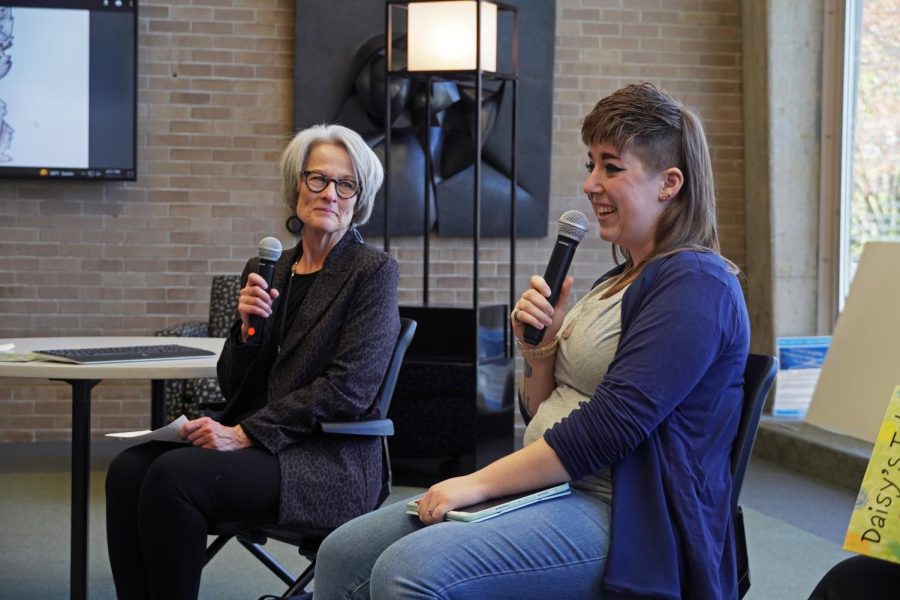Since the signing of a neutrality agreement by the College and the Union of Grinnell Student Dining Workers (UGSDW) on March 4, UGSDW has been taking steps towards an election to vote on the expansion of the Union. By the agreement’s definition of student workers — degree-seeking students who earn hourly wages — Community Advisors (CAs) are not considered student workers, and therefore cannot be members of the UGSDW bargaining unit.
Student workers holding jobs included within the bargaining unit can participate in collective bargaining. In this process, the College and union coming to a legal agreement on the mandatory subjects of bargaining, the wages, hours and terms and conditions of employment at a minimum.
“That is a definition that was decided between the College and the union, and ultimately is one that the union pushed back on, and wanted to immediately include CAs,” said CA and UGSDW Executive Board Member-At-Large Edo Biluar `23 at the student forum held by UGSDW and the College on Tuesday, March 8.
Currently, CAs are compensated for their positions through a room grant and receive no other pay, hourly or otherwise, for their responsibilities as a CA. They do have the option to work another campus job, but for no more than four hours a week.
“It’s hard because it’s not something you can clock in and out of,” Rebecca Fox `24 said.
Fox has been working with the union by putting up posters, encouraging union members to vote and having conversations with other CAs about issues with their contracts. One concern that CAs have is that their contract is subject to change at any time, meaning that they can be asked to take on more responsibilities. Due to this instability, Fox says she looks forward to the inclusion of CAs in union protection.
“You can renegotiate contracts, you can get better pay,” Fox said. “Having a union is like having immune protection to talk about our contracts.”
For students whose room is already covered by scholarships and other aid, the current CA pay model provides them with no compensation. As CAs receive no paycheck unless they work another campus job for the remaining four hours, they are permitted to work under the college’s 20-hour weekly limit for student workers.
Yoel Hooper-Antunez `24 described this issue from his perspective as a low-income student. “We’ve had to decline a position we really wanted to take advantage of solely because we won’t be compensated fairly or equally as to our peers.”
It’s hard because it’s not something you can clock in and out of. -Rebecca Fox `24, Community Advisor
When students do not feel that they can apply for or accept a role as a CA because they cannot afford not to receive a paycheck, the current compensation system discourages low-income students from applying for CA jobs, according to Hooper- Antunez.
“I think it [hourly pay] really would be huge. It’d be a huge victory for low-income students” said Hooper-Antunez.
The details of changes to CA compensation are a topic of conversation that will be considered by the College and the union in their joint Union-Managment Committee. Hichens said that the union was adamant about the inclusion of CAs in the definition of student worker. The College insisted on the element of hourly wages, “refusing to include CAs in that manner, wanting to switch them to hourly first,” UGSDW president Keir Hichens `22.5 said during the forum.
The neutrality agreement lays out the steps required for CAs to be represented by the union. First, there must be a switch to hourly pay. After this, they will be voluntarily accreted into the union by the College. Both the union and the College said they recognized that the switch in compensation is a decision needing careful consideration.
“There was a lot of thinking about the when and the how. There was an initial idea of moving directly into hourly and then there was a pause,” President Anne Harris said during the student forum on Tuesday Mar. 8.
“We are satisfied with and confident in the language that we have that CAs will end up in the bargaining unit after some alternative pathways to getting there,” Hichens said.
I think it [hourly pay] really would be huge. It’d be a huge victory for low-income students. – Yoel Hooper-Antunez `24
Changes to the CA pay model will not occur until after the National Labor Relations Board -administered student worker vote on expansion. Only after CAs are classified as hourly employees will they eligible for inclusion in the union.








































































